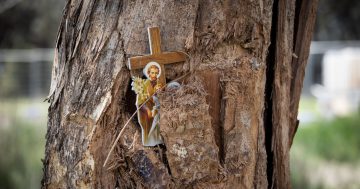
The ACT’s Galambany Circle Sentencing Court has helped tip the scales of justice back towards Indigenous people, a new cost-benefit analysis has found. Photo: Museum of Australian Democracy.
The ACT’s Galambany Circle Sentencing Court has freed up more than $5.3 million from the justice system by moving Indigenous people away from incarceration and into “culturally appropriate sentencing options”.
Diverting Indigenous people away from prison and increasing their community participation has had a positive impact on reducing recidivism rates, increasing education rates and improving the lives of offenders’ families, a cost-benefit analysis commissioned by the ACT Government found.
The program’s $3.3 million costs will provide more than $10.7 million in social returns and savings from incarceration costs in the 10 years to 2026, the analysis found.
One Indigenous woman who appeared before Galambany Circle Sentencing Court said the circle helped tip the scales of justice for First Nations people with its focus on restorative justice.
“White people are more educated and they are more likely to stand up for themselves,” she said. “[It is] harder for Kooris.
“Galambany can help you sort things out and they try to help you sort things out. [In] mainstream court, they don’t help you sort things out. Judge Boss is fair and she listens. Other magistrates could learn from her [because] she listens and asks questions.
“You are given a chance by Elders and the Judge rather than being pre-judged. Mainstream is very adversarial – they get to kick you but you can’t kick back.”
Aboriginal and Torres Strait Islander Elders and other respected persons sit alongside the Magistrate in the circle sentencing court and instil a cultural perspective into sentencing.
A referral to Galambany is only possible if the offence is not a sexual one, the person enters a guilty plea, and they are then assessed to be appropriate for the circle.
They must then complete the entire program.
Treatment services and close supervision throughout the program aim to address underlying issues that brought the person in contact with the justice system in order to help reduce recidivism.

ACT Attorney-General Shane Rattenbury said the ACT needed a holistic approach to reduce Indigenous incarceration. Photo: Michelle Kroll.
It also helps reduce incarceration rates. Research cited in the analysis found that Indigenous people are 23-50 per cent more likely to be sentenced to prison in NSW, South Australia and Western Australia.
Despite comprising less than two per cent of the adult population in the ACT, Aboriginal and Torres Strait Islander people account for almost a quarter of the prisoners at the Alexander Maconochie Centre (AMC).
Recidivism rates are also significantly higher for Indigenous prisoners at AMC, with more than 90 per cent of Indigenous detainees previously incarcerated. This compares to 75 per cent for non-Indigenous detainees.
The 279 per cent increase in Indigenous incarceration in the ACT during the past decade is also five times higher than the national increase of 59 per cent.
A Ministerial Briefing provided to the incoming ACT Minister for Corrections and Justice Health after the 2020 ACT election revealed low diversion rates for Indigenous people going through the criminal justice system.
“The ACT has had the highest increase of Aboriginal and Torres Strait Islander detainees since 2009-2010 of any jurisdiction in Australia,” said the briefing.
“Most data shows 10-year trends in ACT’s Aboriginal and Torres Strait Islander justice data are getting worse.”
ACT Attorney-General Shane Rattenbury said Indigenous-led initiatives, such as the Galambany Circle Sentencing Court, are necessary to holistically address the troubling overrepresentation of Aboriginal and Torres Strait Islander people in the criminal justice system.
Reducing the overrepresentation of Indigenous people in ACT prisons also provides benefits beyond the community, he said.
“Reducing the negative impacts of contact with the justice system for First Nations people also reduces pressure on government services such as courts, hospitals, foster care and emergency housing,” said Mr Rattenbury.
“When you look at that against how much this court costs to run, it’s clear Galambany Circle Sentencing Court is a positive investment for the ACT.”





















